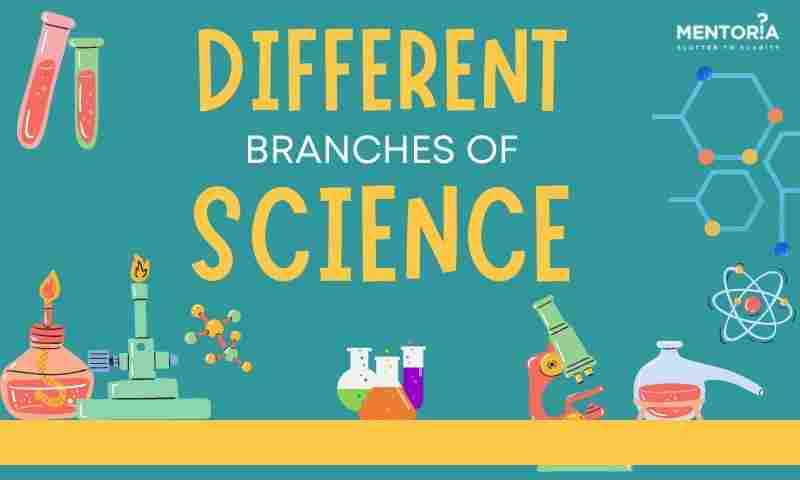Different Branches of Science

We all know the struggle of choosing which stream you want to pursue in the future; after all, you will soon be dedicating a good couple of years to this specific subject! But it seems like you’ve decided to move forward with science! GREAT CHOICE! You will be surprised to know you can divide the subject in multivarious ways! But getting your mind around the never-ending list of branches of science is a gigantic task in itself, let alone getting familiar with the underlying concepts and understanding them!
It is crucial to understand the various meticulously distributed sub-disciplines within the branches of science before picking one and working towards mastering it! Therefore, in this blog, we will be focusing on delineating the different branches of science and the wide range of specialisations they comprise.
Three Branches of Science
Science mainly consists of three main branches, i.e. social sciences, natural sciences, and formal sciences, as these three areas involve everything starting from the tiniest sub atom to our beautiful nature as well as the universe! Thus, the three principal branches of science are:
- Natural Sciences
- Social Sciences
- Formal Sciences
Let us dive into the different branches of science to find out more about it!
Natural Sciences
First, natural sciences are the heart and soul of the branches of science as studies the nature of our physical world and the cosmos.
Natural sciences can be further divided into three different parts:
- Physics is the study of subatomic particles in the entire universe.
- Chemistry is the study of matter.
- Last but not least, biology is the study of Life and Living Organisms.
Social Sciences
Social science is a group of theoretical disciplines that examine human behaviour and how we people interact with each other, behave, evolve as a culture, and impact the world. Unlike natural science, social science can be divided into more than three different parts:
- Psychology
- Sociology
- Anthropology
- Economics
- Archaeology
- History
- Geography
- Law
- Politics
Formal Sciences
Lastly, formal science is an area of study that utilises formal systems to develop knowledge, such as in mathematics and computer science. Formal sciences are essential subjects because all of the quantitative science relies on them for the perfect solution! Here are a few of the branches of formal sciences:
- Mathematics
- Logic
- Computer Science
- Data Science
- Statistics
- Systems Science
- Artificial Intelligence
- Information Technology, etc.
Branches of Natural Science
Modern scientific study is further divided into three primary disciplines: physical sciences, life sciences, and earth sciences, which are also the essential elements of the all-comprising realm of natural sciences. Nevertheless, earth science is often included alongside physical sciences. While Biology, Physics, and Chemistry, or BiPC Subjects, have long been considered the basic components of the massive branch of science, the need to combine these three streams of science to integrate the rapidly growing research and exploration is required.
The different branches of science and their sub-parts!
| Physical Sciences | Life Sciences | Earth Sciences |
| Physics | Anatomy | Astronomy |
| Mechanics | Botany | Meteorology |
| Electromagnetics | Biology | Geology |
| Thermodynamics | Zoology | Atmospheric Sciences |
| Kinetics | Neurobiology | Glaciology |
| Chemistry | Marine Biology | Climatology |
| Inorganic Chemistry | Embryology | Structural Geology |
| Electrochemistry | Ecology | |
| Analytical Chemistry | Palaeontology | |
| Cell Biology | ||
| Genetics | ||
| Ethology |
Physical Sciences
Are you someone who gets intrigued by things they can’t see but for sure can feel? Yes? That’s precisely what physical sciences deal with! It’s the constant study and research of the inorganic aspects of our world, which are naked to human eyes! Physical Sciences consist of fields like astronomy, physics, chemistry and earth sciences. Although physical sciences are considered among the main branches of science, it includes fundamental concepts such as Heat, Magnetics, Acoustics, Optics, Energy, and Analytical Chemistry, amongst several others. While it is hard to draw a line between physics and chemistry, the unique characteristic that sets them apart is that physics essentially studies matter on a subatomic level. In contrast, chemistry explores the properties of various materials and elements and how they react and interact with each other.
JOB PROSPECTS IN PHYSICAL SCIENCE
There are several ways that you can use physical science in a career. Some common jobs involving physical science are:
- Physicist: Physicists are responsible for developing and experimenting with theories in physics. They often conduct experiments and apply physics skills to create scientific equipment.
- Quantum physicist: Quantum physicists are scientists who concentrate on quantum physics, which involves the universe’s behaviour at both atomic and subatomic scales. Quantum physicists often work with the latest scientific theories that have never been explored before.
- Chemist: Chemists are scientists who perform experiments on sub-atomic and molecular matter. They often try and create different chemicals for different purposes. There are many specialities in chemistry, including biochemistry, analytical chemistry, geochemistry, etc.
- Astronomer: Astronomers are scientists who explore and research the universe outside of earth, including galaxies, planets and stars. Astronomers usually use satellites to take photographs of space objects and then examine pictures to learn more about the universe. They can also write computer commands and equations to understand space phenomena better.
- Cosmologist: Cosmologists are scientists who explore the origins of our universe, the relationship between space and time and different universal properties.
- Computer scientist: This is surprising. But, indeed, computer scientists can also benefit from a physics background! Computer scientists are responsible for discovering ways to use computers to crack issues and problems.
Life Science
More extensive than biology, life sciences concentrate on studying all life forms, such as the aquatic, land, and air, at the microscopic level. It covers branches of biology and talks about cross-disciplinary topics such as biochemistry and biophysics, amongst others. In the list of those sects of science that study the living matter, physical sciences talk about concepts like the genetic makeup of living organisms, anatomy, nerve structure, ecology and evolution, agriculture, behavioural sciences, toxicology, parasitology and Virology, amongst others. The courses can be immensely rigorous and intensive, involving heavy learning and research, but if it’s your calling, you will enjoy it no matter what!
JOB PROSPECTS IN LIFE SCIENCE
Life science is applicable to several jobs, particularly in the medical field. Some jobs that involve life science include:
- Marine biologists: Marine biologists are scientists who research marine life. Many marine biologists specialise in unique subjects such as marine mammalogy, marine microbiology and fishery biology.
- Pharmacologists: Pharmacologists are scientists who study and devise medications to treat deadly diseases. They are responsible for trying substances and drugs to check their safety before we can use them. Typically, pharmacologists always have a biology background.
- Forensic scientist: Set your inner Sherlock Holmes free with forensic sciences! Forensic scientists are accountable for investigating crime scenes and evidence to help solve crimes. Often, forensic scientists analyse evidence in laboratories. They can examine and study the DNA to identify crime suspects.
- Agricultural scientist: Agricultural scientists research and conduct experiments associated with crops and farm animals to help improve the farming industry. Agricultural scientists can use their biology skills and knowledge to perform experiments and develop sustainable agricultural methods!
- Virologist: Virologists are scientists who specialise in researching viruses to develop methods to prevent virus infections and outbreaks! Virologists generally need a biology background to advance in their field.
Earth Science
The study of the air, water and earth or, more importantly, the geologic, hydrologic or atmospheric sciences all fall under the spectrum of earth sciences. Concerned with those sects of science that study the earth’s birth, development and evolution, this area of study concentrates on the development of the physical environment. It contains multiple concepts such as the dating of rocks and minerals, the types of stones, and examination of landforms, and fossils, amongst several others. Moreover, the applied earth sciences area operates toward finding practical applications of earth science concepts for our world.
JOB PROSPECTS IN EARTH SCIENCE
Lastly, earth science is an extremely popular career field, and it contains several career options, including:
- Meteorologists: Meteorologists are the ones who analyse the weather and prepare weather forecasts. They also broadcast their weather forecasts on TV news or online video.
- Land planners: Land planners can also utilise the knowledge of earth science. Land planners are accountable for preparing and designing how to regulate and develop the land.
- Oceanographer: Oceanographers are scientists who research and examine the ocean, including different ocean ecosystems, marine life and many other parts of the sea.
- Geologist: Geologists are scientists who examine rocks and other solid parts of the earth and different planets. Geologists often concentrate on various geology-related natural disasters like mudslides and earthquakes.
- Environmental scientist: Environmental scientists are involved with the earth’s changing environment. They can use knowledge of earth science to come up with ways to protect the earth’s health and humans’ health.
Now that you know distinctively about the different branches of science, choosing a career or even a subject which you really want to pursue won’t be difficult at all! And the best part is there’s so much to choose from!
But we get it, too many options sometimes get a bit overwhelming, and that’s completely fine! So let Mentoria be the ultimate confidence you need! Get in touch with us today for the Mentoria Assessment, and let us help you transform your life from clutter to clarity in no time!






